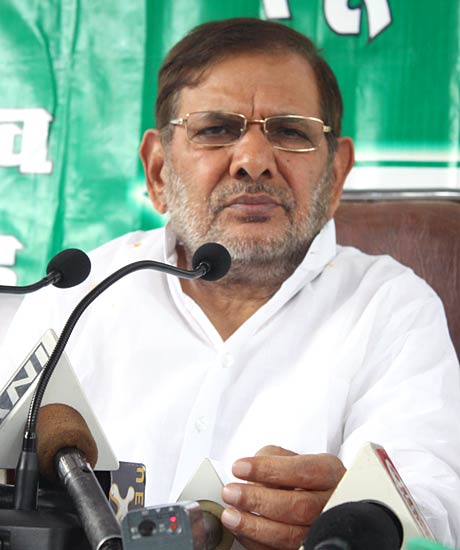 New Delhi, September 10: Carrying further its reservations over Narendra Modi, the Janata Dal (United), which runs a coalition with BJP in BIhar, has decided to contest assembly elections in Gujarat on its own.
New Delhi, September 10: Carrying further its reservations over Narendra Modi, the Janata Dal (United), which runs a coalition with BJP in BIhar, has decided to contest assembly elections in Gujarat on its own.
Bihar chief minister Nitish Kumar, whose antipathy to Modi is well-known, will also campaign for the JD(U) candidates in Gujarat, where elections are due this year end.
Giving indications of the party's plans, JD(U) president Sharad Yadav told reporters "BJP is the larger party in the NDA. We will go for alliance with BJP wherever it wants us, but barring in Gujarat".
He was replying to a question whether JD(U) contesting elections separately in a state ruled by BJP will not give impression of a rift in the NDA.
Both party chief Sharad Yadav as well as Bihar chief minister Nitish Kumar will campaign in Gujrat aggravating further the strains between Kumar and Modi that have come to the fore on more than one occasion.
Yadav, however, sought to downplay the development by maintaining that the JD(U) never had an alliance with the BJP in Gujarat.
He refrained from answering repeated queries on why the JD(U) is making an exception of Gujarat when it is ready to contest with BJP in alliance in all other states.
Yadav also refused to specify how many seats his party wants to contest in Gujarat saying it is for the state unit to decide.
There is speculation that the JD(U) state unit plans to contest 100 out of the 182 assembly seats in Gujarat in the coming assembly elections.
Yadav, however, said,"we have been fighting separately from BJP in Gujarat for a long time. We are as a part of the NDA alliance in many states, while in many others like Gujarat, Madhya Pradesh and Delhi, we fight separately. There was never an alliance in Gujarat." To a specific query whether the Bihar chief minister will go to campaign for JD(U) candidates in Gujarat this time, Yadav said that Kumar and he himself as well as a large number ministers of Bihar government had gone to campaign for the party candidates in last Gujarat assembly elections as well.
"Both of us (Sharad Yadav and Nitish Kumar) have campaigned there earlier also. We will do it this time as well," he said.
JD(U), which is the ruling party in Bihar in alliance with BJP for around eight years, has been contesting elections in alliance with that party in Jharkhand and Rajasthan as well. The alliance between the parties in West Bengal and Tamil Nadu has been off and on many occasions, Yadav said.





Comments
Add new comment